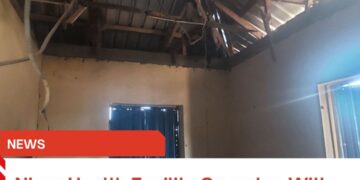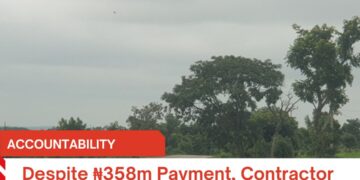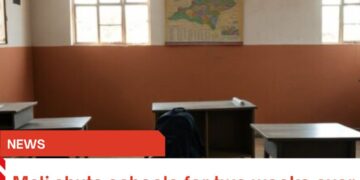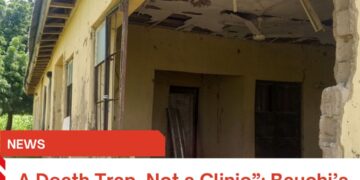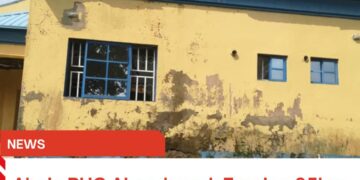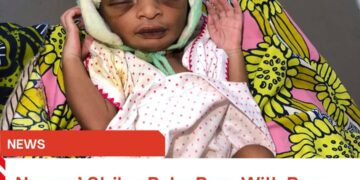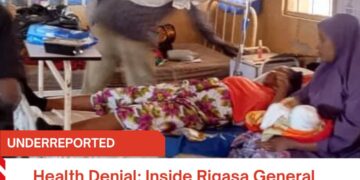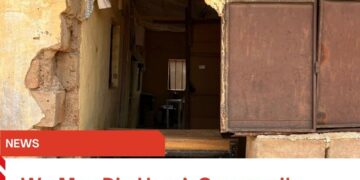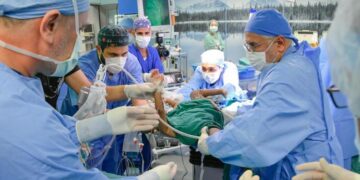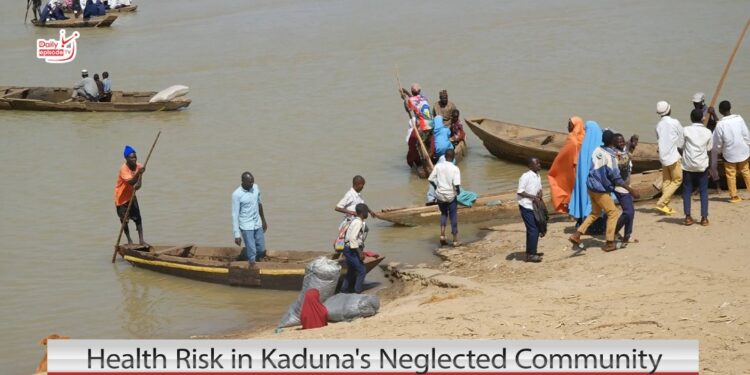Kaduna, Northwest Nigeria – Despite being essential to humans, politicians promise health care, free education, and protection of lives and property during campaigns. Governance ensures citizens enjoy the mention without bother, but in this case, communities surrounding Kurmin Kaduna in Kaduna State’s Igabi local government area are dying for lack of necessities: there is no access road; government schools and hospitals are run by volunteers; security is also provided by a civilian organization, Yan Sakai or Civilian JTF.
I’m saddened, perplexed, and surprised that our community’s primary healthcare facility is always locked. Are we not citizens? We also deserve to be treated in this primary healthcare facility built and abandoned by the Kaduna state government.
Despite the construction of the hospital building and the employment of only one female staff member, Aisha Tanko, a nursing mother, laments losing the chance to immunise her child, for which traditional medicine becomes her only option despite the complications and effects on the newborn baby and the nursing mother.
I’ve been here twice, both in the morning and afternoon; this is how we see our community primary healthcare; locked without explanation or notice, and we can’t always afford to risk plying on a canoe because we don’t always have the means to afford a nearby private hospital, and we also fear the circumstances of the superstition, which holds that crossing the river while pregnant or with a newborn baby harms the mother or the child. Aisha continued while granting an interview to Daily Episode at the primary health care facility entrance at Kurmin Kaduna.
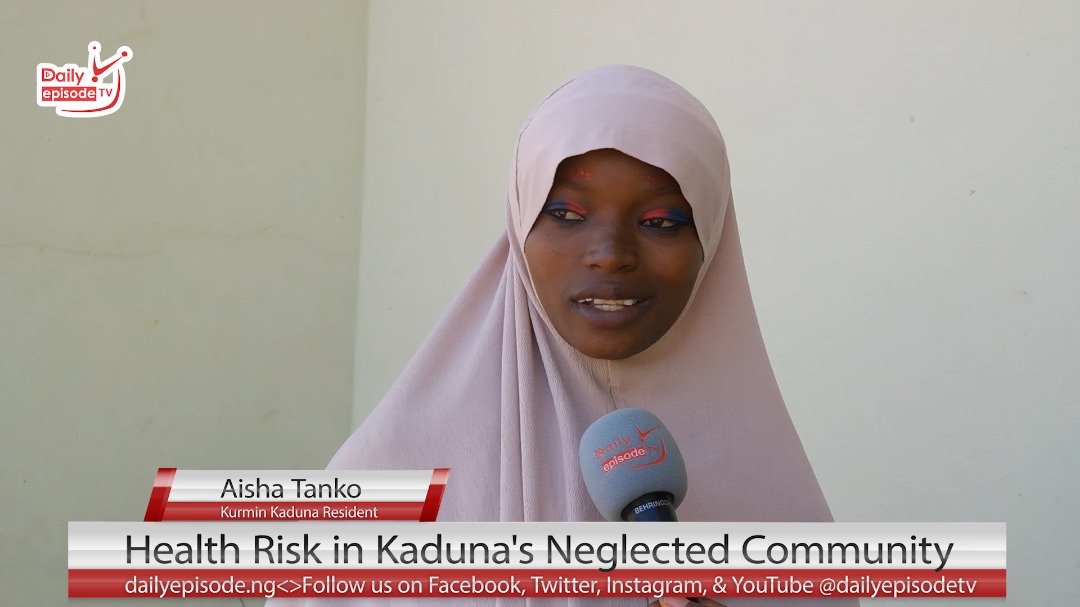
From her conversation, she looks worried and different in her hope and acceptance to give her newborn baby immunisation in an environment where people fight or have yet to accept any vaccination offered by the international community or government, but then the hopes end in vain as the government failed to deploy health personnel, victimising both the child and Aisha.
“You need to see how women receive traditional treatment, how many survive labour with only a rag and a razor blade from traditional birth attendance with no immunisation or proper medication, a situation that triggers vesicovaginal fistula, postpartum psychosis, and contact with infectious diseases bedevilling women and men in their private parts,” Dauda Ismail, a volunteer teacher in the community, laments.
Maryam Umar Said, a licenced community health extension worker in Kaduna, noted that subscribing to a traditional birth attendant endangers the lives of women and their unborn babies during labour hours.
In the absence of an expert or medical doctor during delivery, pregnancy complications resulting in prolonged labour may result in postpartum haemorrhage (PPH), eclampsia, vesicovaginal fistula, postpartum psychosis, uterine laceration, cord prolapse, perineal laceration, and genital trauma that a traditional birth attendant cannot solve and usually result in maternal death.
Therefore, the government must ensure that such practices are discouraged by equipping hospitals with every necessity. She stated
Besides women’s plight, in many instances, when emergencies occur, we only cry and pray for patients to survive the distance and risky road because it usually takes us thirty minutes to access a nearby hospital because of the lack of a link or access road. At worst, the alternative is scary: only motorcycles and canoes, with no guarantee of having a tricycle after we cross with the ailing patients. Dauda continued

The journey of less than a kilometer costs us at least five hundred N500, or $1 equivalent, while hospital bills are higher in the town and only a few can afford to pay, a reason why quacks and traditional herbalists dominate our communities as healthcare practitioners.
MDG, in collaboration with the Kaduna State Government, built this abandoned primary health care facility in our community; why do we have to suffer this? This community has a population of over 10,000 people, and we know that a single functional primary healthcare facility will not serve everyone but will greatly alleviate our suffering if managed.
Therefore, we only request and demand the deployment of nurses and medical doctors, where our emergencies and or day-to-day health check will be attended to without hindrance or fear, where the constant loss of life, the patronising traditional herbalists will be curtailed, Dauda pleaded.
School teachers, security personnel, and the access road demand
Education and security are essential, not a privilege, a responsibility, and not a liability for the government, but the Kurmin Kaduna community enjoys a private responsibility, where the government neglected their purpose, which was only to come for support and vote, while they disappeared with zero promise fulfilment afterwards. A civilian security group leader Muhammadu Mannir cries out.

For the rising insecurity, where no community is safe from bandits’ attacks, we need a police outpost, as local security cannot stand to fight a declared terrorist organisation with sophisticated weapons. To cut the story short, our villages are linked to many other villages that are vulnerable to attack.
Though we had no security threat, no one could guarantee tomorrow’s outcome. A vigilante who pleaded anonymity also lamented
The Kurmin Kaduna community witnessed the government’s construction of a primary school in 1974, which is one of the reasons why the community’s population is now more literate.
Unlike the winning days for the community, the story today is worrisome, sorry, and terrible. More population emerged while the school was consumed by a lack of teachers and a conducive atmosphere for learning due to dilapidated buildings.
One of the volunteer teachers, Dauda Ismail, revealed to Daily Episode that Kurmin Kaduna L.G.E.A. contains about 600–700 students, but only six teachers were deployed, a situation that makes the community youth organisation assign five volunteers for smoother teaching to their children.

According to him, we pleaded for a secondary school from the government, and they approved the operation of the secondary school, but to our surprise, there was no construction or deployment of a teacher to the secondary section.
However, only volunteer teachers teach the secondary school section, which contains about 150 students.
In a situation where the volunteers go about their business activities with nothing for the students, at least the government needs to recognise our efforts, deploy teachers, and support or employ some of the volunteers. He added
Government Agency Response to the above issues
The state faces a challenge in human resources. We want to ensure we have one fully functional facility per ward, which we have achieved. The next step is to assign recently replaced personnel to facilities based on population and disease burden. When that analysis is complete, we will know if we are in a position to add staff to that facility. Dr Neyu Illiyasu, Director of the Kaduna State Primary Health Care Board Management, discloses this to Daily Episode while responding to a question regarding Kurmin Kaduna’s access to healthcare services.
However, the Kaduna State Universal Basic Education Board (SUBEE), the agency responsible for recruiting, deploying, and verifying teachers in the state’s schools, denied comment regarding how volunteer teachers run the affairs of teaching primary and secondary school students of the Kurmin Kaduna community as the board fails to deploy qualified teachers for quality and sound education.
Although a senior staff member at the board who pleaded anonymity disclosed to Daily Episode that the state has recently recruited about 10,000 teachers, he hoped the SUBEB would deploy teachers in those rural communities where teachers are lacking.
LIKE & FOLLOW US ON FACEBOOK, TWITTER, INSTAGRAM, LINKEDIN & YOUTUBE








